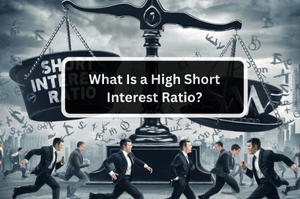What Is a High Short Interest Ratio? – Modest Money

A High Short Interest Ratio means that there is a large relative volume of the shares outstanding of a stock that are currently sold short.
Traders must borrow shares to short sell them, so the volume of shares that are currently borrowed is tracked by stock exchanges.
Therefore, when the ratio is high, there is a large relative volume of the total outstanding shares that are currently borrowed for the purpose of short selling.
A high ratio is an important metric because it is a supplemental source of information about the market sentiment toward a stock.
Stocks with a high ratio can also be subject to a short squeeze.
The mechanics of shorting can lead to a rapid and self-reinforcing spike in the stock price, especially in stocks that also have low daily trading volumes.
Key Takeaways
- The ratio is the relative volume of a stock’s shares outstanding that are currently sold short.
- A high ratio indicates that the market is currently bearish toward a stock and that the stock is vulnerable to a short squeeze.
A Breakdown of the Short Interest Ratio

The ratio is simply the volume of the shares that are currently sold short relative to the total volume of outstanding shares.
This ratio is also known as the percentage of float.
Short sellers need to borrow shares to sell them into the market, so these transactions are tracked by stock exchanges.
The more shares that are currently sold short as a percentage of float, the higher the ratio.
Traders should also be aware of settlement dates, as the ratio will be more variable in the days leading up to trade settlements.
How to Calculate the Short Interest Ratio
The ratio is a simple comparison of relative volume between the shares sold short and the total shares floated.
SI% = Short Interest / Float
Synthetic Shorts and +100% Ratios
Some market information sources will also track or estimate the volume of shares that would be needed to settle synthetic shorts.
Synthetic shorts are created using options contracts to mirror the performance of a short position without needing to borrow shares.
However, these synthetic shorts can still impact the market because of how market makers hedge their positions when they sell these synthetic short options contracts to traders.
Therefore, in some information sources, traders may observe ratios of more than 100%.
How to Use a High Short Interest Ratio
A high ratio is generally considered a bearish signal.
Traders can use this ratio as a supplemental source of information about market sentiment that is not reflected directly in the price chart.
A high ratio can also be the signal for a potential short squeeze caused by the mechanics of the shorting process.
Bearish Signal
The simplest way to use a high ratio is as a bearish signal for trading.
If the short interest is high, then the selling pressure will also be high due to bearish sentiment.
The higher the selling pressure, the lower the share price.
A consistently high or even growing ratio is a strong signal for a bearish trend in the stock price.
Short Squeeze
The other use for a high ratio is as a signal for a potential short squeeze.
Short sellers must buy the shares back from the market before they can return them.
This creates potential buying pressure if many short sellers need to all buy their shares back from the market at once and are faced with limited daily volume.
If a sudden spike in the price causes a large number of short sellers to close their positions at once, this can cause a self-reinforcing process of rising prices.
- The more the price rises, the more short sellers are forced to close their positions.
- The more short sellers close their positions, the more the price rises.
The higher the ratio, the more vulnerable a stock is to a short squeeze.
Lower daily volumes of traded stocks can also exacerbate a short squeeze.
The Best Tools for Trading with a High Short Interest Ratio
The ratio can be used as a simple supplemental trend metric or as a source for discovering explosive short squeezes before they happen.
This indicator is just one example among hundreds of valuable sources of information that traders must have access to for the development of market-beating trading strategies
Only high-end market research tools offer the kind of platform where all this information and more is available at a trader’s fingertips.
Our top recommendations for market research tools for retail traders are:
Recognizing short squeezes is an extremely advanced trading technique, but the potential payoffs are correspondingly large.
Only traders who develop sophisticated trading skills by tracking their trades will be able to consistently beat the market with trades like these.
Our top recommendation for trading journals for retail traders is:
Related Links
Source link



